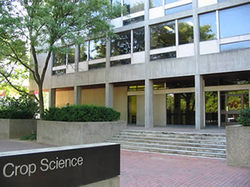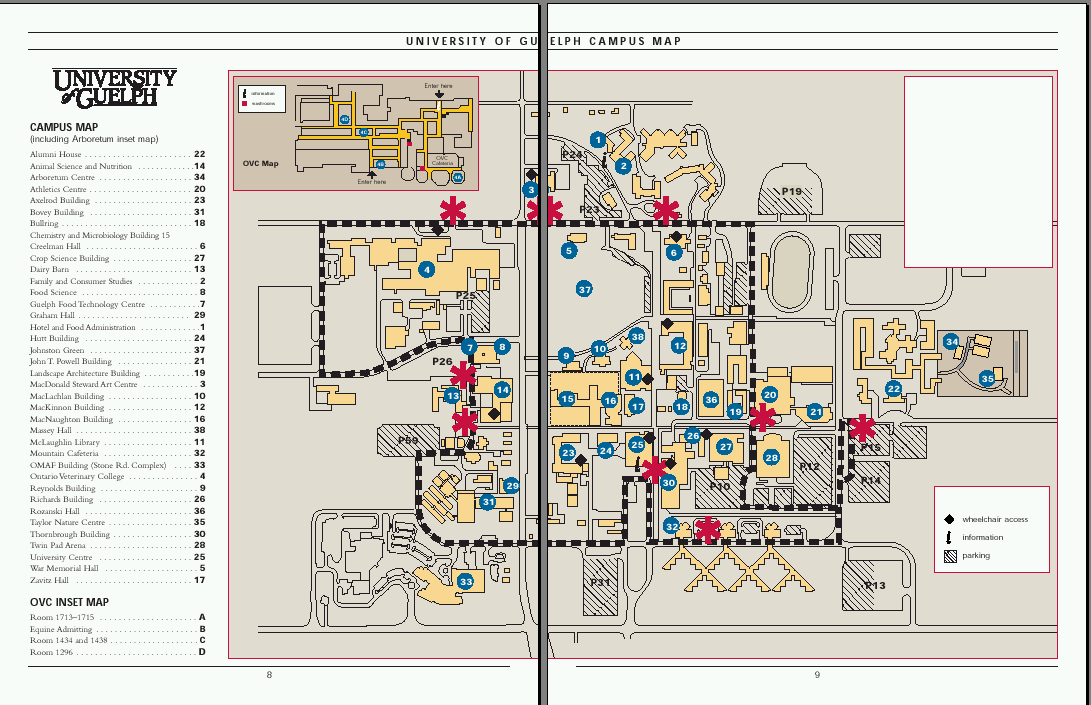Crop Science Building
The present Crop Science Building was opened in 1968. It consists of 4-stories containing 5 classrooms, 47 offices, 59 research laboratories, and a single-storey area which houses growth facilities. The main building's own facilities include: 13 controlled-environment, large, walk-in growth rooms, and 4 rooms housing 51 controlled-environment growth cabinets. The growth rooms provide about 1/10 ha of bench space for growing plants.
The present Crop Science Building was opened in 1968. It consists of 4-stories containing 5 classrooms, 47 offices, 59 research laboratories, and a single-storey area which houses growth facilities. The main building's own facilities include: 13 controlled-environment, large, walk-in growth rooms, and 4 rooms housing 51 controlled-environment growth cabinets. The growth rooms provide about 1/10 ha of bench space for growing plants.
Learn about the Department of Plant Agriculture:
Excellence:http://www.plant.uoguelph.ca/welcome/excellence/excell.htm
History:http://www.plant.uoguelph.ca/welcome/history/history.htm
Our impact: http://www.plant.uoguelph.ca/welcome/impact/impact.htm
Learn more about the campus:
http://www.uoguelph.ca/campus/
Campus Map and Finding the Crop Science Building
(we are located in rooms 310-312 of the Crop Science Building)
http://www.uoguelph.ca/campus/map/
Excellence:http://www.plant.uoguelph.ca/welcome/excellence/excell.htm
History:http://www.plant.uoguelph.ca/welcome/history/history.htm
Our impact: http://www.plant.uoguelph.ca/welcome/impact/impact.htm
Learn more about the campus:
http://www.uoguelph.ca/campus/
Campus Map and Finding the Crop Science Building
(we are located in rooms 310-312 of the Crop Science Building)
http://www.uoguelph.ca/campus/map/
More About the University of Guelph
The University of Guelph is renowned for its commitment to placing students first, research intensity, collaboration with world-class partners, distance education opportunities and international outreach. Guelph's high-quality programs, outstanding faculty and talented
students make one of the top three comprehensive universities in Canada, according to a national survey by Maclean's Magazine (2001).
The university was established in 1964, when its founding colleges - the Ontario Agricultural College (OAC), the Ontario Veterinary College (OVC), and the Macdonald Institute - joined with a new college of arts and science. Today, the institution comprises six colleges: Arts; Biological Science; Physical and Engineering Sciences; Social and Applied Human Sciences; OAC, and OVC. A total of 16,600 students attend U of G, including 14,200 full- and part-time undergraduates and 1,700 full- and part-time graduate students. They pursue more than 80 undergraduate and 45 graduate degree programs.
Guelph attracts the best students - the average entering grade is 85.4 per cent, the highest in Canada for a comprehensive university. Not only do the best students come to Guelph, they stay at Guelph. Numerous programs assist with the transition to university. As a result, the university has an 88 per cent graduation rate that also outranks all other comprehensive universities. And our students continue to succeed after they graduate -- more than 97 per cent of grads entering the labour force find jobs within two years of completing their studies.
Our award-winning faculty plays a key role in student success. More than 100 professors have been recognized for teaching excellence, including 10 prestigious 3M Fellow teaching awards. Among its researchers, Guelph has 19 Fellows of the Royal Society of Canada. Faculty and
students engage in research that has led to breakthroughs in a number of fields. Guelph is the second-most research intensive university in Canada, the first among non-medical schools, with an estimated $92.7 million in research funding annually.
The University attracts students from 82 countries and maintains 36 exchange programs with 16 countries. Guelph has university partners in 30 countries and participates in projects funded by the Canadian International Development Agency and other agencies worth a total of $17
million. There are about 69,000 U of G alumni in 130 countries around the world.
The University of Guelph is renowned for its commitment to placing students first, research intensity, collaboration with world-class partners, distance education opportunities and international outreach. Guelph's high-quality programs, outstanding faculty and talented
students make one of the top three comprehensive universities in Canada, according to a national survey by Maclean's Magazine (2001).
The university was established in 1964, when its founding colleges - the Ontario Agricultural College (OAC), the Ontario Veterinary College (OVC), and the Macdonald Institute - joined with a new college of arts and science. Today, the institution comprises six colleges: Arts; Biological Science; Physical and Engineering Sciences; Social and Applied Human Sciences; OAC, and OVC. A total of 16,600 students attend U of G, including 14,200 full- and part-time undergraduates and 1,700 full- and part-time graduate students. They pursue more than 80 undergraduate and 45 graduate degree programs.
Guelph attracts the best students - the average entering grade is 85.4 per cent, the highest in Canada for a comprehensive university. Not only do the best students come to Guelph, they stay at Guelph. Numerous programs assist with the transition to university. As a result, the university has an 88 per cent graduation rate that also outranks all other comprehensive universities. And our students continue to succeed after they graduate -- more than 97 per cent of grads entering the labour force find jobs within two years of completing their studies.
Our award-winning faculty plays a key role in student success. More than 100 professors have been recognized for teaching excellence, including 10 prestigious 3M Fellow teaching awards. Among its researchers, Guelph has 19 Fellows of the Royal Society of Canada. Faculty and
students engage in research that has led to breakthroughs in a number of fields. Guelph is the second-most research intensive university in Canada, the first among non-medical schools, with an estimated $92.7 million in research funding annually.
The University attracts students from 82 countries and maintains 36 exchange programs with 16 countries. Guelph has university partners in 30 countries and participates in projects funded by the Canadian International Development Agency and other agencies worth a total of $17
million. There are about 69,000 U of G alumni in 130 countries around the world.

